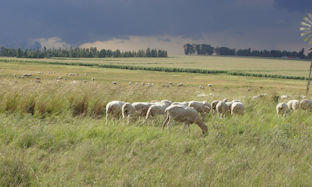
SHEEP MANAGEMENT PRE-LAMBING: Vaccination
This is article 3 of 6 articles on this topic
Good immunity is one of the most important pillars of good health care. Late pregnant ewes' immune system is under tremendous pressure and needs to be supported. The vaccination of ewes in late pregnancy (4-6 weeks before lambing) is not only important for the ewe, but also to protect lambs against certain disease conditions after birth.
The newborn lamb is born without immunity and is totally dependent on good quality colostrum, high in antibodies, to kick his immune system into gear. Good nutrition of the ewe and an appropriate vaccination program in late pregnancy will optimize colostrum quality and the transfer of protective antibodies to the lamb.
The following are normally the disease conditions for which protection must be granted:
Essential vaccines
Pulpy kidney - with an increase in good quality nutrition in late pregnancy and an immune system that is under pressure, it is essential that ewes' immunity against pulpy kidney (Clostridium perfringens) is optimized by timely vaccination. Various pulpy kidney vaccines and clostridium combination vaccines are available.
Combination vaccines are generally recommended for vaccination in late pregnancy, as it is beneficial to also protect the lambs against a variety of clostridium-related diseases in the first few weeks after birth. This protection is provided by good quality colostrum passed on to the lambs.
Some combination vaccines, in addition to covering several clostridium-related diseases, also contain antigens for protection against lung diseases (Mannheimia haemolitica / Pasteurella multocida / Bibersteinia trehalosi).
Pasteurella - which is generally known as "pneumonia" or “bont long”. Large variation in day/night temperatures, dusty environments, adverse weather conditions and intensive conditions increase the chances of lung-related diseases in ewes and lambs. Lambs arriving in autumn and winter/early spring are particularly vulnerable. Combination vaccines (as mentioned above) can be used or separate vaccines can be administered.
By vaccinating ewes in late pregnancy, the quality of colostrum can be increased and transferred to the lamb through the colostrum. This will provide protection to the lamb in the first few weeks after birth.
Optional vaccines
Optional vaccines are included in a late pregnancy program when specific disease challenges occur, e.g.
E. coli - when diarrhea in lambs is a big problem, ewes can be vaccinated before lambing to give better protection to the lambs. E coli consists of many strains. The identification of the specific strain(s) on a farm is recommended. If this is not covered by the commercially available vaccine, an autogenous (farm/pathogen-specific) vaccine can be produced. An E coli vaccine is usually recommended where problems with cryptosporidium are experienced.
Blue-udder - if its appearance becomes a problem, the vaccine can be tried. Udders rarely recover after ewes get blue udder and it can even lead to deaths.
ORF/”Vuilbek” - where orf occurs it can have catastrophic consequences during lambing time. The sores that develop on the teats of the ewes, makes it difficult for the lamb to suckle. The ewes' feed intake will also not be optimal due to the sores on the ewe's lips/mouth, which negatively affect milk production and lamb growth.
A vaccination programme, which is appropriate for the area or specific farming conditions, should be drawn up in collaboration with the local veterinarian. Please contact your local vet for the most suitable vaccines for your area.
NB. Good nutrition and trace mineral supplementation simultaneous vir vaccination can increase the effectiveness of vaccines.

